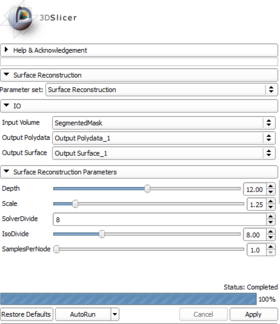Difference between revisions of "Documentation/Nightly/Extensions/SurfaceReconstruction"
Chenchen78 (talk | contribs) |
Chenchen78 (talk | contribs) |
||
| Line 29: | Line 29: | ||
{| | {| | ||
|[[Image:InputMask.png|thumb|340px|Input Mask Image]] | |[[Image:InputMask.png|thumb|340px|Input Mask Image]] | ||
| − | |[[Image:.png|thumb| | + | |[[Image:OutputSurface.png|thumb|250px|Output Surface]] |
| − | |||
| − | |||
| − | |||
| − | |||
|} | |} | ||
| Line 44: | Line 40: | ||
{| | {| | ||
| | | | ||
| − | |[[Image:.png|thumb|280px|Module UI]] | + | |[[Image:ModuleUI.png|thumb|280px|Module UI]] |
|} | |} | ||
Revision as of 16:50, 7 May 2014
Home < Documentation < Nightly < Extensions < SurfaceReconstruction
|
For the latest Slicer documentation, visit the read-the-docs. |
Introduction and Acknowledgements
|
Extension: SurfaceReconstruction Author: Chenxi-Zhang (SPL & FDU) |
Module Description
A SurfaceReconstruction model produces a surface from a segmented contour. The input is a mask and the output is a surface
Use Cases
Tutorials
Panels and their use
Similar Modules
References
- Xiaodong Tao, Ming-ching Chang, “A Skull Stripping Method Using Deformable Surface and Tissue Classification”, SPIE Medical Imaging, San Diego, CA, 2010.
- Ming-ching Chang, Xiaodong Tao “Subvoxel Segmentation and Representation of Brain Cortex Using Fuzzy Clustering and Gradient Vector Diffusion”, SPIE Medical Imaging, San Diego, CA, 2010.
Information for Developers
| Section under construction. |


